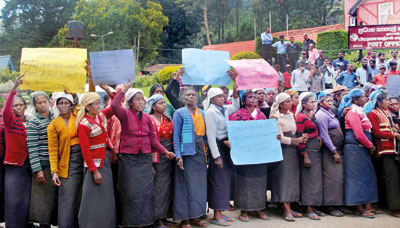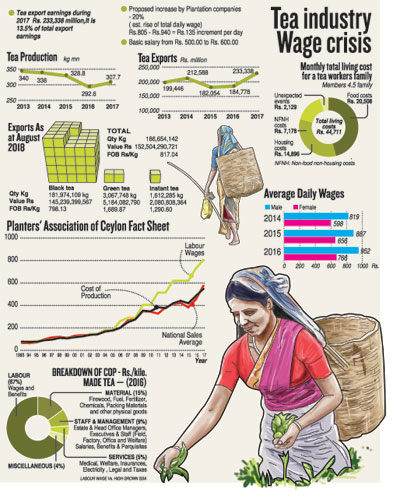News
Wage demands over tea leaves industry stewing
The beleaguered plantation industry is facing another serious challenge over deadlocked talks between plantation sector trade unions and Regional Plantation Companies over a collective agreement on worker wages.

Nuwara Eliya: Tea plantation workers hold a protest demanding higher wages
The latest crisis comes at one of the most testing times for the sector, with the tea industry denied access to the lucrative Japanese market, labour shortages, skyrocketing production costs, and falling tea and rubber prices.
Three trade unions, the Lanka Jathika Estate Workers Union (LJEWU), Ceylon Workers’ Congress (CWC) and the Joint Plantation Trade Union Centre (JPTUC), are signatories to the current collective agreement. In negotiating the new agreement they have demanded that basic salaries of workers be increased by Rs. 500-1000 a day.
The tough stance taken by the unions has seen them reject three proposals put forward so far by the plantation companies. Demonstrations by plantation workers, largely confined to the hill country in past weeks, on Wednesday spread to Colombo.
Despite the pressure, the plantation companies dug in their heels and issued a statement on Thursday saying they would not go beyond their last and “final offer” of an all-inclusive wage hike of Rs. 940 a day with the basic salary component increased to Rs. 600.
Under the existing collective agreement, workers are paid a basic salary of Rs. 500 in addition to an Attendance Incentive (AI) of Rs. 60, a Productivity Incentive (PI) of Rs 140 and a Price Share Supplement (PSS) of Rs. 30, and an Employee Provident/Trust Fund (EPF/ETF) payment of Rs. 75, amounting to a total daily wage of Rs. 805.
With both parties now at stalemate, unions, all backed by powerful upcountry political parties, have sought government intervention to break the deadlock. On Wednesday, Prime Minister Ranil Wickremesinghe held a discussion with government officials, including the Treasury Secretary and the Commissioner-General of Labour on the issue. He also met with trade union representatives and officials from the Planters’ Association of Ceylon, which represents the plantation companies.
LJEWU General Secretary Vadivel Suresh told the Sunday Times his union would only accept the word of the Prime Minister and were awaiting his response. Mr. Suresh insisted unions were not ready to accept proposals the companies had offered so far. If the Prime Minister failed to give satisfaction there would be intensified union action.
“Workers require at least a Rs. 1,000 salary. They have to deal with leeches and leopards and face the hot sun. They deserve better pay,” he emphasised.
Meanwhile, Deputy Minister of Social Welfare and Primary Industries, Muthu Sivalingam, who is also an MP from the CWC, claimed estate workers were leaving the industry because companies paid poor wages and ignored workers’ basic needs.
“The children of workers are getting a better education now and are migrating to towns in search of work as the estates pay them poor salaries to work eight hours plucking tea,” he said. He also said the lodgings provided for workers were poor in quality and lacked water connection.
Plantation companies insist they would not be able to go beyond their “final offer” of an all-inclusive pay rise of Rs. 940, including a 20 per cent increase in the basic wage up to Rs. 600. Their offer includes a 33 per cent increase in the Attendance Incentive up to Rs. 80 and a 20 per cent increase in EPF/ETF up to Rs. 90. The association claims this amounts to an average increase of Rs. 3,375 per month for workers.
“In previous collective agreements, there was only a 10 per cent increase in the basic salary but we have proposed a 20 per cent increase this time,” Planters’ Association Chairman Sunil Poholiyadde said on Thursday. Mr Poholiyadde stressed there was no way plantation companies could increase the basic salary to Rs 1,000 given the current state of the plantation industry.
Mr. Poholiyadde painted a grim picture, noting that tea sector had already lost access to the lucrative Japanese market due to the imposition of the glyphosate ban amid fears from the Japanese on the levels of residue present in chemicals used as alternatives.
The cost of production for a kilo of tea had also risen sharply while the price of rubber had plunged, declining to less than Rs. 300 from Rs. 600 just six years ago.
Tea auction prices were also on a downward trend, yet companies had continued to increase worker wages every two years after entering into new collective agreements.
This situation was unsustainable, the Planters’ Association Chairman stressed, adding that only way a Rs. 1,000 daily wage demanded by unions was feasible was if the industry shifted entirely to a productivity-based wage model. In the tea sector, this would mean that Rs. 46 will be paid for every kilo of tea harvested.
Employers’ Federation of Ceylon Plantation Services Group Chairman Roshan Rajadurai claimed 80 per cent of workers already earn up to Rs.1,000 a day due to over-kilo pay, according to reports from plantation companies.
Mr. Rajadurai said tea pluckers who were able to bring in harvests above the norm of 16-18kg were entitled to “over-kilo pay” which is currently at Rs. 28.75 for every kilo above the norm. As such, a worker who plucks a few kilos above the norm could expect a daily wage exceeding Rs. 1,000, it was stressed.
Mr. Rajadurai claimed that if the employers’ final offer was accepted, the impact of the increase in terms of what he calls “gratuity payments” alone (pay for ageing workers who bring in lower harvests) would be in excess of Rs. 5 billion to the industry, while more than Rs. 300 million would be added to the cost of production.
Despite the deadlock in negotiations, the Planters’ Association expressed hope that the matter could still be resolved. “We have already held several rounds of discussions with the trade unions and negotiations will continue,” Mr. Poholiyadde said, pointing out that on the last occasion, negotiations dragged on for 14 months until a new collective agreement was signed.
Some plantation workers lamented that life would be difficult for their families, even in the unlikely event that wages were increased to Rs. 1,000. Sivanaiyah Ladchumanan, a 51-year-old labourer, said even the “reasonable demand” of a basic wage of Rs. 1,000 would be inadequate to support a family of three as prices of goods, including those for basic needs, had increased significantly.
“We have been struggling to meet daily expenses with Rs. 500 as a basic wage along with other allowances which amounts to Rs 14,000 a month. When the collective agreement comes to be renewed every year we are assured of a wage rise by various political parties and trade unions but nothing happens to improve our plight,” he said.
Mr. Ladchumanan was of the view that if the three signatory trade unions could not protect the interests and the welfare of plantation workers, they should withdraw from the collective agreement immediately rather than drawing Rs. 150 in “trade union fees” from the workers’ monthly salary.
“They failed us to ensure a decent wage but they need fees from our salary to develop their own political parties and unions whereas we continue to suffer,” he said.
| High production costs, ageing workforce threaten industry | |
| “The workers have a genuine grievance and their salaries need to be increased, but we must also think of the situation of the companies,” Secretary to the Ministry of Plantation Industries J.A. Ranjith said.He pointed out that the cost of production for tea was extremely high, making it virtually impossible to grant a 100 per cent increase in basic salaries, as demanded by unions. “We however, are hopeful that a compromise involving a basic salary hike between Rs. 600-700 is possible and will be acceptable to all parties,” he said. Since plantation companies were established in 1992, the workforce on the plantations has decreased from 350,000 to about 150,000 today, leading to a severe shortage of labour. The workforce is composed mainly of individuals who have served for 25 to 30 years. “Many are nearing retirement age and once a salary hike is applied, it will apply to them too. This would mean that companies will have to pay huge sums as ‘gratuity’ for a large number of workers. This is also one reason why they are reluctant to lift wages by a big margin,” Mr. Ranjith said. Companies had also complained that the government’s action in allocating plantation lands for various development activities was hampering them as more lands lost to the companies translated to lower profits. “There are several among the 23 Regional Plantation Companies that are in a difficult state. We are discussing what can be done about them,” he said. Mr. Ranjith said that at the discussions held this week, Prime Minister Ranil Wickremesinghe had instructed government officials to see whether any concessions – in the form of tax relief or otherwise – could be granted to plantation companies in a bid to offset the financial impact of a wage rise. |

